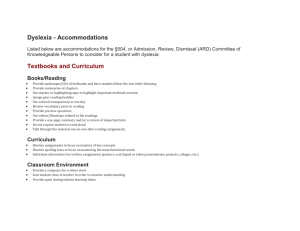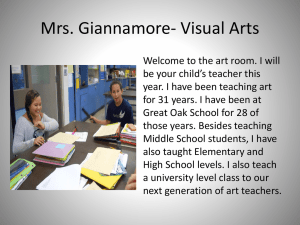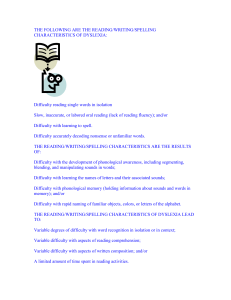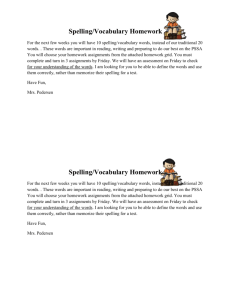LEARNING BEHAVIORS CHECKLIST Tier 1 Form Student Name
advertisement
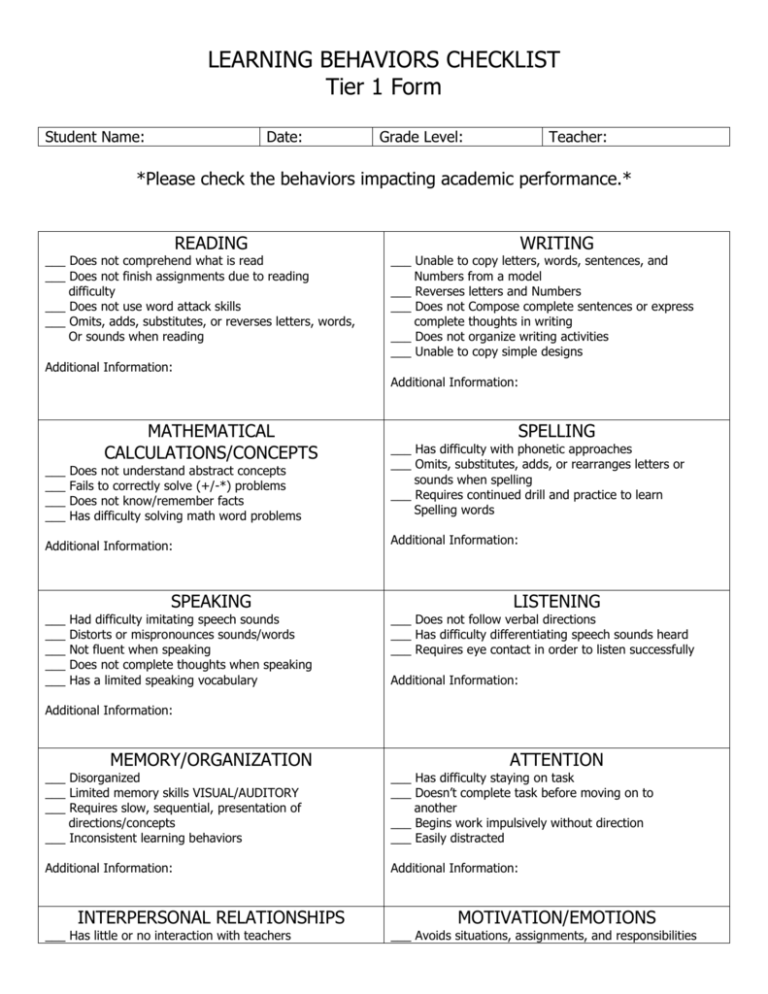
LEARNING BEHAVIORS CHECKLIST Tier 1 Form Student Name: Date: Grade Level: Teacher: *Please check the behaviors impacting academic performance.* READING ___ Does not comprehend what is read ___ Does not finish assignments due to reading difficulty ___ Does not use word attack skills ___ Omits, adds, substitutes, or reverses letters, words, Or sounds when reading Additional Information: MATHEMATICAL CALCULATIONS/CONCEPTS ___ ___ ___ ___ Does not understand abstract concepts Fails to correctly solve (+/-*) problems Does not know/remember facts Has difficulty solving math word problems Additional Information: SPEAKING ___ ___ ___ ___ ___ Had difficulty imitating speech sounds Distorts or mispronounces sounds/words Not fluent when speaking Does not complete thoughts when speaking Has a limited speaking vocabulary WRITING ___ Unable to copy letters, words, sentences, and Numbers from a model ___ Reverses letters and Numbers ___ Does not Compose complete sentences or express complete thoughts in writing ___ Does not organize writing activities ___ Unable to copy simple designs Additional Information: SPELLING ___ Has difficulty with phonetic approaches ___ Omits, substitutes, adds, or rearranges letters or sounds when spelling ___ Requires continued drill and practice to learn Spelling words Additional Information: LISTENING ___ Does not follow verbal directions ___ Has difficulty differentiating speech sounds heard ___ Requires eye contact in order to listen successfully Additional Information: Additional Information: MEMORY/ORGANIZATION ATTENTION ___ Disorganized ___ Limited memory skills VISUAL/AUDITORY ___ Requires slow, sequential, presentation of directions/concepts ___ Inconsistent learning behaviors ___ Has difficulty staying on task ___ Doesn’t complete task before moving on to another ___ Begins work impulsively without direction ___ Easily distracted Additional Information: Additional Information: INTERPERSONAL RELATIONSHIPS ___ Has little or no interaction with teachers MOTIVATION/EMOTIONS ___ Avoids situations, assignments, and responsibilities ___ ___ ___ ___ ___ Has little or no interaction with peers Bothers other students Cannot work appropriately in small groups Touches other inappropriately in small groups Appears to always be the victim Additional Information: ___ Ignores consequences of behavior ___ Does not appear to care about academic performances ___ Easily agitated/hostile ___ Does not take responsibility for actions Additional Information: Interventions/Modifications Attempted What strategies were tried to correct the behavior? Please indicate the date on which the strategy was initiated and terminated, how data was gathered, and the outcome achieved by use of the strategy. ENVIRONMENTAL STRATEGIES ___ ___ ___ ___ ___ ___ Preferential seating Small group instruction Individual instruction Learning centers Seating among well focused students Provide student extra or secluded work space ___ Other: ORGANIZATIONAL STRATEGIES ___ Time limits for assignments ___ Frequent questioning to help focus on important information ___ Allowing additional time to complete task/take test ___ Organizing a notebook or providing folder to help organize work ___ Asking student to repeat back Directions given ___ Highlighting main facts ___ Assignments are always posted as well as given orally ___ Parents initial homework ___ Assignment checklist or calendar provided for student ___ End of day clarification of homework ___ End of day clarification of homework Not turned in ___ Other: MOTIVATIONAL STRATEGIES ___ Sending home daily/weekly progress reports DATE INITIATED DATE TERMINATED HOW DATA IS COLLECTED AND RESULTS OF DATA ___ Immediate reinforcement of student’s Progress ___ Keeping graphs and charts of student’s progress ___ Conferencing with student’s parents ___ Increased parent contact (e.g. phone, email, notes home) ___ Conferencing with student’s other teachers ___ Student reading lesson to aide, peer Tutor, or teacher ___ Regular feedback and progress check Within an assignment ___ Emphasize correct answer rather than marking incorrect answers ___ Reward system: ___ Other: PRESENTATION STRATEGIES ___ Giving assignments/directions orally and visually ___ Allowing oral responses when others are giving written responses ___ Recording directions/lessons so student can listen repeatedly ___ Immediate reinforcement of correct response ___ Allowing student to have sample or practice test ___ Relate topics to previous learning and “real world” ___ Use of a scribe ___ Allow students have tests orally read ___ Other: CURRICULUM STRATEGIES ___ Special materials (books, MP3 player, language master, manipulatives, calculator, computer. etc.) ___ Providing opportunities for extra drill (Lexia, Think Central, reading series, etc.) ___ Providing study guide (word lists, outlines, optional projects, etc.) ___ Reducing quantity of material ___ Providing instructional materials geared to students level of basic skills ___ Modification of assignments ___ Memory strategies ___ Other: BEHAVIOR STRATEGIES ___ Communication between school and home ___ Behavior system in class (e.g. positive behavior, CHAMPS, SLANT, BEAR) ___ ___ ___ ___ ___ ___ ___ ___ ___ Token system Time-out Affective education Skills streaming Five clear-cut communicated rules Immediate consequences Fast pace and consistent routine Additional responsibilities Discuss problem/solutions with peers/grade level staff ___ Establish rapport with student ___ Student contract ___ Change student groupings, seating ___ Consult with SPED teacher/school psychologist/other staff members ___ Private, personal cuing and signals used with a student ___ Opportunities to work cooperatively with another student or small group ___ Other: ALTERNATE PROGRAM STRATEGIES ___ Interventionist (math, reading, speech, OT/PT) ___ One-on-one/small group assistance from staff member ___ Title I ___ Parent volunteers ___ Conferencing with school psychologist/school nurse ___ Community resources ___ Other: OTHER STRATEGIES ___ 1. ___2. NOTES: Signature/Date

